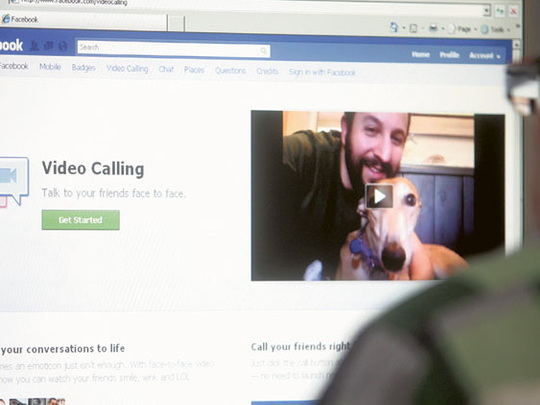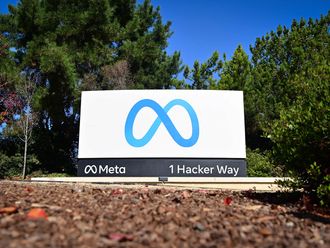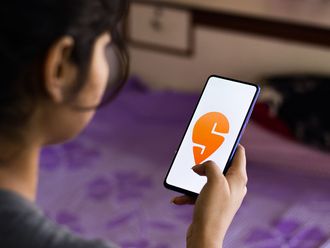
Dubai: The impact of Facebook's offering of new free Skype-powered video calling services on its global social media network is still uncertain in the UAE, say telecom analysts.
While separate stand-alone Skype software is still not legally licensed in the country, the question remains whether Skype-powered video calling that is physically integrated into the Facebook website is viewed by authorities as a legal activity.
The Telecommunications Regulatory Authority (TRA), etisalat and du could not be reached by Gulf News for comment by deadline Thursday.
Account holders will not be asked by Facebook overseers to download the Skype platform in order to access free video calling services — effective Wednesday, Facebook said the new one-on-one video calling service is now an option for users within the chat box on its website.
Click the video call button
Facebook engineer Phillip Su writes on his Facebook blog that "a few months ago we started working with Skype to bring video calling to Facebook. We built it right into chat so all your conversations start from the same place. To call a friend, just click the video call button at the top of your chat window.
"For those of us who have been working on this, it's particularly exciting to bring video calling to over 750 million people. We're making this available in over 70 languages so friends can stay in touch all over the world."
On its website, Facebook doesn't mention offering its video calling services to the Middle East where Skype software is banned by telecoms which derive the lion's share of revenues from international calls placed by paid land and mobile phone subscribers.
Gulf News tried to access the new video calling service once logged on to Facebook but an error message appeared.
Chris Fernando, managing editor of PC Magazine Middle and Near East, said Thursday that he also tested the new service but the service wouldn't work.
"I've been trying to use it but an error keeps popping up," Fernando said, adding that the original Skype platform's performance in the UAE is a patchwork quilt with some people reporting that they can't use the video calling service, while others can."Many people can't access Skype anymore."
Skype blocked
A quick check by Gulf News also revealed that the skype.com website is still blocked by UAE authorities.
Rolling out a new Skype-power video calling service makes sense globally, Fernando said, in order to compete with new social network Google+ and its video calling service.
"I would say that Facebook is doing this because Google+ has this feature built in with Google video. Facebook is covering its tracks."
Video calling
When Google+ is fully launched, Fernando said that Google+ video calling may not be available to UAE account holders as well. Hassan Sandila, telecoms analyst for IDC Middle East, Turkey and Africa, said it isn't clear whether Facebook's video calling will be blocked by UAE authorities.
"Since it does not directly affect the revenue of the telecom operators, the Skype ban in the UAE is more to do with the PC to phone calls and not PC to PC calls. In all probability, like everywhere else in the world, Facebook users in the UAE should also be able to access the newly launched Facebook-Skype video-calling service," he said.
"Otherwise, Facebook might not consider getting into regulatory matters because UAE accounts for very small proportion of the total Facebook subscriber base."
Competition
Sandila believes that Facebook could be in for some tough competition from Google+ given differences in technology used to offer video calling services.
"Skype calls are routed using a PC application and network of connected PCs. On the contrary, Google+ video calling services utilises a 100 per cent hosted environment, thus requiring significantly less bandwidth compared to Skype. This ensures better quality of service of Google+ offerings which might be difficult for Skype to replicate," Sandila said. "Going forward, IDC believes that there will be tougher competition in the social networking domain, where Google+ will be eyeing to build its customer base and Facebook focusing more on user traffic retention."
Facebook's announcement, meanwhile, comes after Microsoft's $8.5 billion (Dh31 billion) acquisition of Skype in May.
Shortly after the acquisition, Gulf News asked the TRA if Skype was legal and the authority issued a revised copy of its policy noting that only licensed operators can engage VoIP services. The TRA's VoIP Policy of December 2009 describes video calling as "a service that allows transmitting, receiving, delivering and routing of voice telecommunications by means of internet protocol."
VoIP
It further states that "no person may engage in a regulated activity such as the provision of public telecommunications services unless licensed to do so in accordance with the telecommunications law.
Currently, etisalat, du and Star Communications are the only entities which are licensed to provide retail VoIP services to subscribers in the UAE." Mohammad Al Ganem, director general of the TRA said in a statement in December 2010 that "only telecom service providers in the UAE are licensed to offer VoIP services and they have started to provide these services already."












